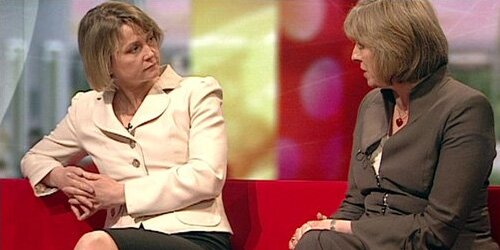Cameron’s Tories are getting MORE socially conservative not less
12:01 pm - February 10th 2013
| Tweet | Share on Tumblr |
Something that I haven’t seen much covered since this week’s vote on the Equal Marriage bill is just how much it tells us about the social conservatism of the 2010 Tory MP intake.
Using the data on the vote from the Guardian Data Blog I have sorted those Tory MPs who voted for the bill into four categories. Those first elected before 1990, those first elected during the 1990s, those elected during the 2000s and those first elected in 2010.
I think the results tell an interesting story:
We all know that fewer Conservative MPs voted for the bill than voted against or abstained. But the trend here is very noteworthy. There is a steady increase in the percentages voting for the change as the first elected range increases through the decades.
But suddenly for those elected in 2010 this goes into reverse. A lower percentage of the 2010 cohort voted for change than their 2000s colleagues (and that is already from a pretty low starting base).
This is very strange. Most of the MPs elected in 2010 will have been born and raised during a time when homosexuality has been legal. They will have seen things like the equalisation of the age of consent, the scrapping of Clause 28 and the introduction of civil partnerships all from outside of the House of Commons.
They have literally grown up during a time of social progression and enlightenment on LGBT+ issues. And yet the majority of them were not willing to vote for the equalisation of marriage rights.
Whatever the arguments (and I have yet to see a really good principled argument against equalisation that doesn’t appeal to the authority of some religious text or relies on slippery slope nonsense) David Cameron who took a clear lead on this issue has a big problem.
The MPs that were elected in the general election where he led his party are more socially conservative than his contemporaries from the 2000s intakes. They seem to be getting more out of touch, not less.
If Cameron and other senior Tories ever want their party to reflect the open tolerant and socially liberal nation they wish to lead they are going to have to do some serious thinking about how to persuade those that make up the parliamentary party (and those who seek entry) their views are antediluvian and completely out of place in modern Britain.
—
cross posted from Mark Reckons.
| Tweet | Share on Tumblr |  |
Mark Thompson is an occasional Liberal Conspiracy contributor. He is a Lib Dem member and activist and blogs about UK politics here
· Other posts by Mark Thompson
Story Filed Under: Blog ,Conservative Party ,Equality ,Westminster
Sorry, the comment form is closed at this time.
Reader comments
You assume the more recently they became an MP the younger they are, but that ain’t necessarily so. Is there a similar graph showing age rather than when they were first voted in?
PS It’d be interested to see a graph like that for all MPs. In Cumbria we have six MPs, four of whom (two Labour. a Lib Dem and a Tory) voted for, the other two (one Labour and one Tory) voted against (no abstentions).
The four ‘fors’ were all born in the 70s, the Tory against was born in the 60s and the Labour against was born in the 50s.
Interesting that a young Tory can be more liberal than an old Labourite!
[deleted]
Remember, not many new Tory MPs were elected in 2005 and shedloads were elected in 2010. So the selection process for a winnable seat was much harsher in 2005 than in 2010 – meaning that the 2005 intake are likely to be less “donkey in a blue rosette”-ish than the 2010 intake.
It’s also worth remembering that, since the average new intake MP is mid-30s, we’re now reaching the generation where only absolute lunatics were Tories at uni (because they were in the death throes of the Major government or the pre-disgrace Blair bubble at the time), and many people who would in previous years have become centrist Tories became Orange Book LDs instead.
Interesting that a young Tory can be more liberal than an old Labourite!
Not really – more “more accepting of current social customs”. Gay relationships aren’t controversial or novel among young people; homophobia is. So supporting the right of gay people to solemnise their relationship look in a traditional style doesn’t really require any liberalism.
A true liberal is someone like Wolfenden, who (as a man of his generation) viewed homosexuality weird and a bit gross, but understood that it should be legalised anyway because the government has no right to tell us we shouldn’t do weird and gross consenting things.
(the extreme porn legislation is an excellent example of illiberal legislation in this context. It criminalises the depiction of various things that consenting adults can do that society finds weird and a bit gross. Homosexual acts are excluded not because the people who supported the law are liberal, but rather because we no longer find homosexual acts weird and a bit gross.)
It’s such a small difference it’s too close to mean anything. It must only amount to a handful of MPs, who may vote differently on an identical vote under similar circumstances. It’s not worth thinking about.
Wot Cherub said. There’s definitely a trend of more recent MPs being liberal on the issue, but the 2010 dip isn’t statistically significant. If I was going to take anything from it, it’d be that the trend has slowed down or plateaued.
“I have yet to see a really good principled argument against equalisation that doesn’t appeal to the authority of some religious text or relies on slippery slope nonsense.”
Well here’s one. Social traditions are not accidental. They are the result of the collective wisdom of human experience built up over long periods – in the case of marriage, over thousands of years. It’s fair then to assume that they embody a sense of the fitness of things which is not readily open to a day-to-day rational analysis, and that to meddle with thousands of years of tradition is a potentially risky business. Inevitably, the consequences are unknown – it’s impossible to assess the costs and benefits.
And that’s the point. A stroke of the pen changes the law. But it cannot change human experience.
@Churm: Nice try but seems to fall into the category of “slippery slope”. It actually seems like you don’t quite know why you are against it but just have a vague feeling that things might not be well with the world once the change takes effect. A classic small c conservative position.
I think the fact that there is little (if any) strong principled arguments against it grounded in solid evidence is part of the reason why the opposition to it within our body politic eventually fell away.
If only that could not happen in some other areas! Drugs laws anyone?
@9 Mark Thompson: I agree. The argument I outlined is indeed the basis for the “slippery slope” point of view. But that doesn’t mean it’s wrong.
It’s been argued at LibCon that once the definition of marriage is subject to legislation, then there’s nothing to prevent incestuous marriage, or indeed marriage to animals, being approved by future legislation. Such situations have been dismissed by supporters of gay marriage as “unthinkable”. Yet it’s not so long ago that same sex marriage was dismissed in similar terms.
And I’m not sure why you should say that there is no solid evidence against gay marriage. My point was that thousands of years of human experience must provide some sort of testimony, which of course you are free to dismiss.
My own view is that legislation is a limited tool. I heartily approve of civil partnerships, which are a legal construct and as such are an entirely appropriate and democratic arrangement. But I’m cautious about any attempt to redefine any institution which embodies thousands of years of human experience.
@10
Whatever is being redefined certainly hasn’t been in place for thousands of years as you imply. Marriage has gone through repeated redefinitions over the years. We do not allow polygamy(whereas, if the bible is to be believed, it was acceptable). Prior to 1836 one could not have a non-religious registry office marriage. In 1907 it was ‘redefined’ so that a man could marry his dead wife’s sister. (Plus many other ‘redefinitions’ over the years.)
So this is simply part of a continuous process. Also, to repeat the nonsense that there would be nothing to prevent marriage to animals is beneath contempt.
Unnatural sexual practices should NOT be encouraged.
“there’s nothing to prevent incestuous marriage, or indeed marriage to animals, being approved by future legislation.”
*Sounds Slippery Slope Klaxon*
How many new Tory MPs were elected in the 2000s? Given that the Tories made a net gain of 1 seat in 2001 (George Osborne in Tatton), and not a huge amount more in 2005, I’m not sure the cohort is large enough to support sweeping statistical conclusions.
@TimJ: I haven’t looked at the numbers for that but you may well be right and in a way doesn’t that make it worse? The first time in a political generation that there is a big influx of new Tory MPs results in a cohort that is more socially conservative than their most recent predecessors when the country is going in a more socially liberal direction?
Churm, it might the case that we only have heterosexual marriages today because, years ago, to be openly gay was to be killed, rather than because homosexual marriage is not wise.
Religious and secular authorities have been interfering with marriage almost since marriage has existed. Parliament started divorcing people in, what, the late 1500s? About 260 years ago we required Catholics to marry in Anglican churches. And of course the minimum age has been changed at various times. There’s tons more – look it up.
It’s as if you and others hold up marriage as this singularly defined, unchanging institution born of collective wisdom over thousands of years, when in fact it’s an ever-changing outcome of social, economic and political attitudes to two (or more) people coming together for a variety of reasons – from love to economic and political advantage.
Churm: see my point above. Society thinks that polygamy and bestiality are weird and gross, so society won’t vote to allow those marriages to happen. Back in the day, society didn’t think that old men fucking little girls was particularly weird or gross, so those marriages were allowed to happen. Now we do, so they aren’t.
If we were ever to reach the point where polygamy or bestiality were considered by society to not be weird or gross, then polygamous or bestial marriages (there is an obvious difference between the former, which is between consenting adults, and the latter, which isn’t, by the way) might be allowed to happen.
But if were to reach that point, then only the occasional marginal lunatic on the sidelines (hi Vincent!) would object, so why worry?
It doesn’t mean anything. Most of those elected before 1990 – 67% of whom now support gay marriage – would have supported Clause 28 in the Eighties.
Politician’s views change with experience: older Tories know there are votes to be gained from young people by liberalising their attitudes to homosexuality while former Lefties in inner city areas know there are votes to be gained there by pandering to homophobes.
@TimJ: I haven’t looked at the numbers for that but you may well be right and in a way doesn’t that make it worse? The first time in a political generation that there is a big influx of new Tory MPs results in a cohort that is more socially conservative than their most recent predecessors when the country is going in a more socially liberal direction?
Not true, for the reasons I stated above. You’ve taken a snapshot of one party at the moment and utterly failed to take into account that politics is a dynamic process. Had you made this analysis ten years ago you would have found many of those now supporting gay marriage were catagorically against it at the time: almost all of those voted in before the Nineties would have supported Section 28.
You seem to think political parties and individual politicians don’t change their opinion over time.
If only that could not happen in some other areas! Drugs laws anyone?
In many ways this prohibition is even more baffling: unlike homosexuality most voters will have experienced drugs themselves, without suffering any harm, but generation after generation deny that right to their own children.
And I’m not sure why you should say that there is no solid evidence against gay marriage. My point was that thousands of years of human experience must provide some sort of testimony, which of course you are free to dismiss
You are confusing ‘evidence’ with ‘habit’ and ‘superstition’.
I think my favourite intervention was from my own MP John Stanley, who opposed gay marriage, because gayness is “perfectly normal phase of being attracted to other young people of the same sex before arriving at a heterosexual orientation subsequently.”
Sir John Stanley was educated at Charterhouse…
Tim: absolutely fucking golden. Love it.
@ 2o Shatterface
“In many ways this prohibition is even more baffling: unlike homosexuality most voters will have experienced drugs themselves, without suffering any harm, but generation after generation deny that right to their own children.”
They normally leap gratefully onto the claim that “it’s stronger now”, happily missing the obvious point that people tend not to drink whisky in pint glasses.
Say no to buggery.
Reactions: Twitter, blogs
Sorry, the comment form is closed at this time.
NEWS ARTICLES ARCHIVE





















